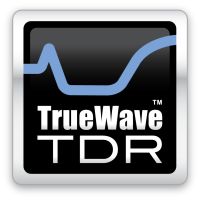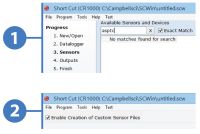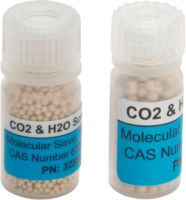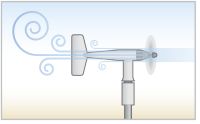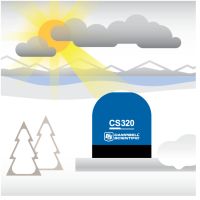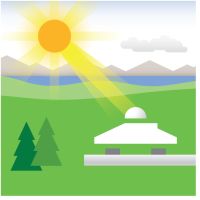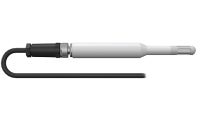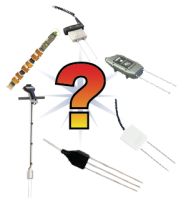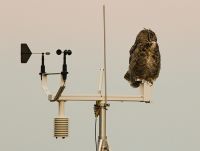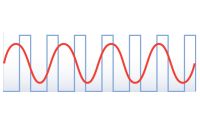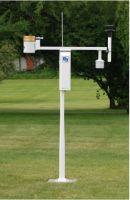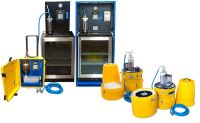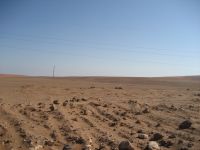Sensor Topics Your source for sensor-related articles
Displaying 21 - 39 of 39 articles
Taking In-Situ Soil Measurements to New Performance Depths
著者: Dirk Baker | 最終更新日: 04/17/2019 | コメント: 0
Advances in technology and mechanical design offer vast improvements for those of you who need soil measurements at multiple depths—especially environmental researchers and anyone who works with environmental monitoring networks. In this article, we’ll take a closer look at the measurement challenges you may face... 続きを読むHow to Create Custom Sensors in Short Cut
著者: Jason Ritter | 最終更新日: 02/27/2019 | コメント: 4
Have you ever wanted Short Cut to support more sensors? Although Short Cut supports many sensors, you may have found that the sensor you want to measure is not on the list. What do you do then? How do you add that sensor to your... 続きを読むNew Product Support: Bifacial Plane of Array (BPOA), solar energy’s newest irradiance expression
著者: Matt Perry | 最終更新日: 12/12/2018 | コメント: 1
Plane of array irradiance (POA) is a well-known term used to quantify the incident irradiance on a given solar array. It is the parameter most directly related to the power output of a PV module and is used extensively in PV performance analysis and modeling... 続きを読むNo Compromise: Quality Weather Measurements and Simplicity
著者: Robin Deissinger | 最終更新日: 10/17/2018 | コメント: 2
Can a simplified weather station solution still provide you with good measurements? In this interview, Alan Hinckley, Senior Application Scientist-Meteorologist, shares his excitement for the ClimaVue™50 and how users of various backgrounds can benefit from its simplicity in capturing quality weather data. Alan was interviewed... 続きを読むA Safer Solution to Scrub Agents from Campbell Scientific Gas Analyzers
著者: Ben Conrad | 最終更新日: 06/25/2018 | コメント: 0
If you have an eddy-covariance system, you understand the importance of performing routine maintenance tasks so you can continue to acquire high-quality, consistently reliable data. Some of these maintenance tasks are straightforward, such as making sure that the optics on your gas analyzer are clean... 続きを読むWhy Do Variable Wind Speed Readings Occur with a Constant Wind?
著者: Jacob Davis | 最終更新日: 01/31/2018 | コメント: 4
At some point, you may have watched the real-time wind readings from your data logger and seen the wind speed bouncing back and forth. Then, you probably wondered if it really was that gusty outside. In many cases, what you are seeing is the resolution... 続きを読むMeasuring the Sun More Accurately and Simply
著者: Chod Stephens | 最終更新日: 09/13/2017 | コメント: 4
To help environmental researchers who measure solar radiation improve their measurements and simplify their lives, Campbell Scientific and Apogee Instruments teamed up to develop a new sensor. This new sensor combines features from higher-end blackbody thermopile pyranometers and lower-end silicon photocell pyranometers. The CS320 Digital Thermopile... 続きを読むPyranometers: What You Need to Know
著者: Alan Hinckley | 最終更新日: 06/14/2017 | コメント: 13
If you are considering using pyranometers in your measurement application, there are many things you should know about them and how they work. Having this information in hand will help ensure you select the type of pyranometer most suitable for the data you need for... 続きを読むAir Temperature and RH Sensors: What You Need to Know
著者: Bart Nef | 最終更新日: 05/17/2017 | コメント: 8
Although air temperature and relative humidity (RH) sensors provide the benefit of an economical means to collect measurement data for two parameters, there are some issues related to these sensors that you should be aware of. In this article, I’ll provide some background on air... 続きを読むMinimize Losses from Frost Using Direct Measurements
著者: Dirk Baker | 最終更新日: 02/08/2017 | コメント: 0
Are you concerned about frost damage to your crops? There are a number of high-value crops that are critically vulnerable to frost damage. Especially on buds, flowers, and early fruit, frost can cost growers thousands of dollars per acre. For a long time, many growers have monitored... 続きを読むThe Most Rugged Air Temp/RH Sensor We Know of: the EE181
著者: Robin Deissinger | 最終更新日: 12/14/2016 | コメント: 0
In this interview, Chod Stephens, the product manager for the new EE181-L, tells us why this new sensor is ideal for Campbell Scientific customers with deployment sites in extreme environments. Chod is the Technical Product Manager for the Environmental Group at Campbell Scientific, Inc. He... 続きを読むアプリケーションに最適な土壌水分含有量センサを見つける方法
著者: Jason Ritter | 最終更新日: 07/06/2016 | コメント: 4
土壌水分含有量センサーにはさまざまな種類があるため、用途に最適なものを選択するのは難しく、混乱するかもしれません。選択を支援するには、土壌水分含有量センサーが実際に何を測定するのか、優れた土壌水分含有量センサーの特徴は何か、メーカーの仕様をどのように理解するかを理解することが重要です。この記事では、センサーの選択プロセスに役立つこれらのトピックについて説明します。 土壌水分含有量センサーは実際に何を測定するのでしょうか? 水分を直接測定する市販の土壌水分含有量センサーがないことに驚かれるかもしれません。代わりに、センサーは、水分含有量に関連する他の土壌特性の変化を予測可能な方法で検出します。水分含有量によって変化し、簡単に測定できる一般的な土壌特性には、誘電率、熱伝導率、中性子束密度などがあります。この記事では、誘電率を測定するセンサーに焦点を当てます。 誘電率センサーは、市場で最も一般的なタイプの土壌水分含有量センサーです。これらのセンサーは、次のようなさまざまな技術を使用して周囲の土壌の誘電率を測定します。 Time domain reflectometry Time domain transmissivity Frequency domain reflectometry Time of charge capacitance Transmission line oscillation Coaxial impedance dielectric reflectometry Coaxial differential amplitude reflectometry 技術に関係なく、同じ原理が使われます。土壌のバルク誘電率は体積水分含有量に応じて変化します。 誘電率を最も簡単に考える方法は、蓄えられた電気エネルギーと考えることです。センサーは土壌に電界を生成し、水分子は極性があるため、土壌内の結合していない水分子は電界線に沿って回転します。 結合していない水分子の回転にはエネルギーが必要で、このエネルギーは整列した水分子に位置エネルギーとして蓄えられます。土壌に水分が多いほど、蓄えられるエネルギーも多くなり、土壌の体積誘電率が高くなります。 土壌の他の成分、つまり鉱物や有機固形物、空気も電気エネルギーを蓄えますが、水は土壌の他の部分の 10 倍以上のエネルギーを蓄えることができます。そのため、センサーの測定体積に出入りする水の動きが誘電率の変化に大きく影響します。 土壌水分量センサーは、誘電率、つまり水分量に応じて変化する電気信号を出力するように設計されています。一部のセンサーは誘電率を決定してから水分量に変換しますが、他のセンサーはセンサーの電気出力を 1 回のステップで体積水分量に変換します。どちらの方法を使用する場合でも、土壌の水分は体積誘電率に影響し、それがセンサーの電気出力に影響します。精度仕様を比較するときには、この点を覚えておくことが重要です。 優れた土壌水分含有量センサーとはどのようなものでしょうか? 理想的な高性能土壌水分含有量センサーは、次の特性をすべて備えています。 精度と解像度の要件を満たします。 必要な期間だけ使用できます。 校正は最小限で済み、再校正は必要ありません。 予算の要件を満たします。 設置と測定が簡単です。 ご想像のとおり、これらの特性は互いに競合する可能性があります。たとえば、耐久性があり高精度のセンサーは、耐久性が低く精度が低いセンサーと比較すると高価になる可能性があります。センサーメーカーは、これらの競合する要素の適切なバランスを見つけようとします。アプリケーションに最適なセンサーを決定するには、これらの要素のどれが最も重要かを判断し、最優先事項に最も一致するセンサーを探します。 メーカーの仕様とは何を意味しますか? 土壌水分含有量センサーの仕様を本当に理解するには、水分含有量、誘電率、および誘電率に応じて変化する電気信号の関係について考えると役立ちます。これら 3 つの関係によって、水分含有量値の精度と解像度、およびセンサーの動作範囲が決まります。 正確度 体積水分含有量測定の精度は、いくつかの要素に依存します。 電気測定の精度 測定電子機器に対する温度の影響 水の誘電率と土壌の電気伝導率に対する温度の影響 異なる誘電率の値を推定するセンサーの精度 電気測定値または誘電率値を体積水分含有量に変換する関数の精度 センサー周囲の土壌が校正関数とどの程度一致するか すべての土壌水分含有量センサーが誘電率の測定精度仕様を提供していれば、さまざまなセンサーの性能を比較するのがはるかに簡単になります。残念ながら、多くのユーザーは誘電率と体積水分含有量の関係、および最終的な水分含有量の推定値に誤差を加える可能性のあるさまざまな条件を完全に理解していません。 すべての土壌に機能する単一の校正機能はないため、メーカーは通常、1 つまたはいくつかの「代表的な」土壌を選択し、その選択に基づいて水分含有量の精度仕様を提供します。では、たとえば、「±1% 体積水分含有量」などの精度仕様は実際には何を意味するのでしょうか。この仕様は、校正作業が行われた条件下での ±1% を意味します。これらの条件は、おそらく屋内で、温度変化が最小限で、代表的な土壌タイプが 1 つまたは数種類しかない場合です。 ご使用の環境が同じ条件である場合、センサーの精度は仕様を満たします。 センサーを自然環境(変動がはるかに大きい)に設置する場合、独自のキャリブレーションを実行しない限り、精度が仕様を満たさない可能性があります。 もう 1 つの重要な考慮事項は、土壌が非常に乾燥すると、誘電土壌水分含有量センサーの精度が低下することです。土壌内の水分量が非常に少ない場合、土壌全体の体積誘電率に対する水分の寄与は小さくなり、センサーの変化検出能力を下回る場合があります。乾燥した土壌では、水分含有量の変化よりも温度がセンサー出力に大きく影響することがよくあります。 ヒント: 低水分含有量レベルで高い精度を保証する仕様には十分注意してください。 注意: 精度は絶対精度 (水分率/乾燥土壌率) または読み取り値のパーセンテージとして指定できます。読み取り値のパーセンテージを絶対精度に変換するには、動作範囲の上限と下限を掛けます。... 続きを読む6 Tips to Protect Your Weather Station from Birds
著者: Robin Deissinger | 最終更新日: 05/25/2016 | コメント: 0
You’ve got your weather station set up and running, your data is coming across just fine, and then a bird decides your station is a wonderful place to make a home. That’s great for the bird, but not so great for the performance of your... 続きを読むHow to Select the Correct Pulse Type for Your Measurements
著者: Jacob Davis | 最終更新日: 04/21/2016 | コメント: 0
Have you ever had a sensor work on a P (pulse) data logger terminal, but not on a C (control) terminal? Is the list of choices for the PConfig parameter in the PulseCount() instruction daunting? Campbell Scientific data loggers offer several options for measuring pulse... 続きを読むHow to Convert Wind Directions in Degrees to Compass Directions
著者: Jacob Davis | 最終更新日: 01/06/2016 | コメント: 2
Do you feel lost when sifting through wind direction data that is listed in degrees? For example, can you picture in your mind what direction 195 degrees is? Would it be easier if your data logger could put your data in compass directions instead? In... 続きを読む8 ET Station Components that Need Regular Maintenance
著者: Bruce Smith | 最終更新日: 09/23/2015 | コメント: 0
Like most machines, automated weather stations require regular maintenance to provide you with better performance and longer life expectancy. A weather station designed to calculate evapotranspiration (ET) for commercial agriculture and irrigation scheduling has a number of components that require maintenance and calibration. Based on... 続きを読むAutomatic Water Sampler Maintenance Tips
著者: Robin Deissinger | 最終更新日: 07/29/2015 | コメント: 1
If you use automatic water-sampling equipment, consider performing a maintenance check-up during the month of August, which is National Water Quality Month in the U.S. When you perform a maintenance check-up, you can help ensure that your equipment is operating at an optimal level and that you... 続きを読むHow to Prevent Skipped Scans and a Sunburn
著者: Jacob Davis | 最終更新日: 06/17/2015 | コメント: 3
Through programming, relatively slow SDI-12 measurements can coexist, without problems, alongside fast measurements. To illustrate the need for accommodations in your data logger program, I will share the story of the worst sunburn I ever got. Southern Peru is near the Pacific Ocean, yet is... 続きを読むHow to Check the Accuracy of Your Solar Radiation Measurements
著者: Bruce Smith | 最終更新日: 05/29/2015 | コメント: 0
Solar radiation is an important measurement for many researchers and those who are monitoring their evapotranspiration values for irrigation purposes. If you have been wondering how accurate your solar radiation measurement is, Apogee Instruments (an associated company of Campbell Scientific) has a Clear Sky Calculator mobile... 続きを読む











